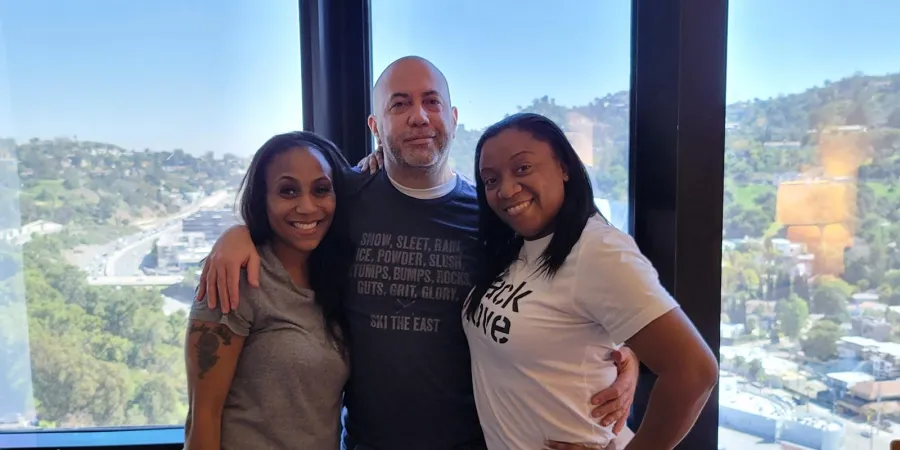NY paramedics make in-flight rescue

NEW YORK – Three New York City emergency medical services paramedics saved a distressed airline passenger on a Sunday night Jet Blue flight to California on March 28. Their heroic and quick action midflight also helped the airline avoid an emergency landing.
“We had been in the air about four hours and I had dozed off when a flight attendant called for help with a medical emergency,” said Krystal Hayes, a 14-year veteran Fire Department of New York (FDNY) lieutenant and member of EMS Officers Local 3621.
Although their seats were scattered, Paramedic Andria Connell and EMT Oren Barzilay immediately stood up together with Hayes and came forward as volunteers to help the elderly woman who had difficulty breathing.
“When the flight attendant called for help, I stood up, Andria and Krystal were right behind me. We worked great as a team. The training we receive throughout our careers kicked in,” Barzilay said.
“She could not talk,” Hayes recalled. “When she was able to speak she said there were too many people on the flight.”
The three first responders asked permission to evaluate the woman’s vitals. Barzilay asked the daughter to give him her seat so he could sit next to her mom. That way he could start examining her and take her blood pressure, while Hayes was checking her lungs and heart. They asked about her medical history. The woman was adamant about staying with her daughter, who said her mother had an extensive medical history. The flight attendant could not gauge the woman’s oxygen levels, the paramedics said.
Once they received clearance to open the plane’s medical kit, the paramedics began emergency treatment. The kit was similar to what EMS workers use on duty. The woman had a pulse oximeter that the paramedics used to measure her oxygen saturation levels, which had dropped dangerously low.
“Normal levels are 95% and above, hers was 83,” said Barzilay, president of Uniformed EMTs, Paramedics and Fire Inspectors Local 2507. Oxygen deprivation can cause serious health issues that affect mental status, interrupt breathing and can lead to respiratory or cardiac arrest, said Hayes.
The team treated the passenger with Albuterol to open the airways to her lungs. They carefully observed COVID-19 restrictions and did not release aerosol particles into the cabin.
“We gave her oxygen and got her stabilized. Her oxygen level came up to normal so we were assured that she could make the rest of the flight,” said Barzilay.
“It’s second nature to us. Our training becomes a lifestyle, to help and assist is part of our daily life. We reacted as if we were on an ambulance,” said Connell, a 15-year FDNY paramedic and licensed mental health counselor.
The EMS paramedics were en route to an advanced mental health care seminar for training to offer peer support and help FDNY first responders cope with post-traumatic stress. EMS paramedics are on the front line of essential workers leading New York’s pandemic response. The COVID-19 pandemic created one of the most difficult years in decades, Barzilay said. “It’s been like a war zone with no let up.”
The majority of 911 calls in the nation are made in New York City. Between March and June 2020, the number of COVID-19 emergency calls EMS responded to spiked to about 7,000 a day, Barzilay said. That figure almost doubles the 4,000 daily responses made pre-pandemic. FDNY paramedics earn about $60,000 annually after five years on the job.
Emergency calls are answered and dispatched by Police Department 911 Technicians in Local 1549 and are then routed to EMS call takers and EMS Dispatchers of Local 2507.
“If we weren’t there to help, this woman would have been in grave danger and the flight would have had to be diverted to land thousands of miles from JFK airport,” Barzilay explained. “We are all human and care for each other. We were able to save a life and save Jet Blue and its other passengers the time and expense of an emergency landing. We’re glad we helped avert a life-threatening situation.”
“DC 37 applauds these special heroes for saving a woman in medical distress midflight. We appreciate our dedicated essential workers who are tirelessly helping New Yorkers get through these unprecedented and extremely challenging times,” said DC 37 Executive Director Henry Garrido.
